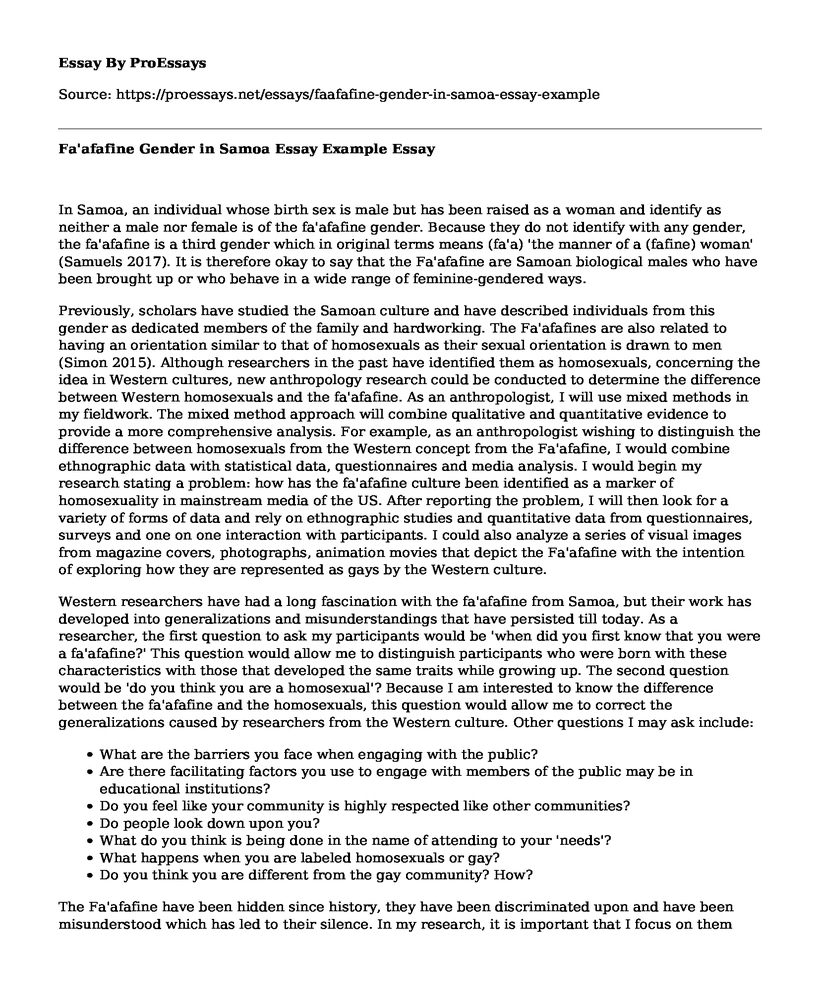In Samoa, an individual whose birth sex is male but has been raised as a woman and identify as neither a male nor female is of the fa'afafine gender. Because they do not identify with any gender, the fa'afafine is a third gender which in original terms means (fa'a) 'the manner of a (fafine) woman' (Samuels 2017). It is therefore okay to say that the Fa'afafine are Samoan biological males who have been brought up or who behave in a wide range of feminine-gendered ways.
Previously, scholars have studied the Samoan culture and have described individuals from this gender as dedicated members of the family and hardworking. The Fa'afafines are also related to having an orientation similar to that of homosexuals as their sexual orientation is drawn to men (Simon 2015). Although researchers in the past have identified them as homosexuals, concerning the idea in Western cultures, new anthropology research could be conducted to determine the difference between Western homosexuals and the fa'afafine. As an anthropologist, I will use mixed methods in my fieldwork. The mixed method approach will combine qualitative and quantitative evidence to provide a more comprehensive analysis. For example, as an anthropologist wishing to distinguish the difference between homosexuals from the Western concept from the Fa'afafine, I would combine ethnographic data with statistical data, questionnaires and media analysis. I would begin my research stating a problem: how has the fa'afafine culture been identified as a marker of homosexuality in mainstream media of the US. After reporting the problem, I will then look for a variety of forms of data and rely on ethnographic studies and quantitative data from questionnaires, surveys and one on one interaction with participants. I could also analyze a series of visual images from magazine covers, photographs, animation movies that depict the Fa'afafine with the intention of exploring how they are represented as gays by the Western culture.
Western researchers have had a long fascination with the fa'afafine from Samoa, but their work has developed into generalizations and misunderstandings that have persisted till today. As a researcher, the first question to ask my participants would be 'when did you first know that you were a fa'afafine?' This question would allow me to distinguish participants who were born with these characteristics with those that developed the same traits while growing up. The second question would be 'do you think you are a homosexual'? Because I am interested to know the difference between the fa'afafine and the homosexuals, this question would allow me to correct the generalizations caused by researchers from the Western culture. Other questions I may ask include:
- What are the barriers you face when engaging with the public?
- Are there facilitating factors you use to engage with members of the public may be in educational institutions?
- Do you feel like your community is highly respected like other communities?
- Do people look down upon you?
- What do you think is being done in the name of attending to your 'needs'?
- What happens when you are labeled homosexuals or gay?
- Do you think you are different from the gay community? How?
The Fa'afafine have been hidden since history, they have been discriminated upon and have been misunderstood which has led to their silence. In my research, it is important that I focus on them and have some of them assist in the study. In my research, I will give them a chance to write their own stories, from their perspectives.
References
Samuels, A. (2017). Fa'afafines: the Third Gender in Samoa Retrieved from https://theculturetrip.com/pacific/samoa/articles/fa-afafines-the-third-gender/
Simon, K. (2015). Fa'afafine, The recognized third gender of Samoa Retrieved from http://www.versiondaily.com/samoa-faafafine-the-recognised-third-gender/
Cite this page
Fa'afafine Gender in Samoa Essay Example. (2022, Nov 20). Retrieved from https://proessays.net/essays/faafafine-gender-in-samoa-essay-example
If you are the original author of this essay and no longer wish to have it published on the ProEssays website, please click below to request its removal:
- Essay Sample on Federal and State Policies Regarding Same-Sex Marriage
- Gendered Self Essay
- Essay on Sexuality in Music Videos
- Essay Example on Same-Sex Marriage: A Historical Perspective
- Essay on Women's Equality, Racism, and LGBT Rights: Examining U.S. Issues in the 21st Century
- Essay Example on LGBT Rights: Progress Amidst Controversy
- Essay on Homosexuality: Social Acceptance, Punishment, and Cultural Change







